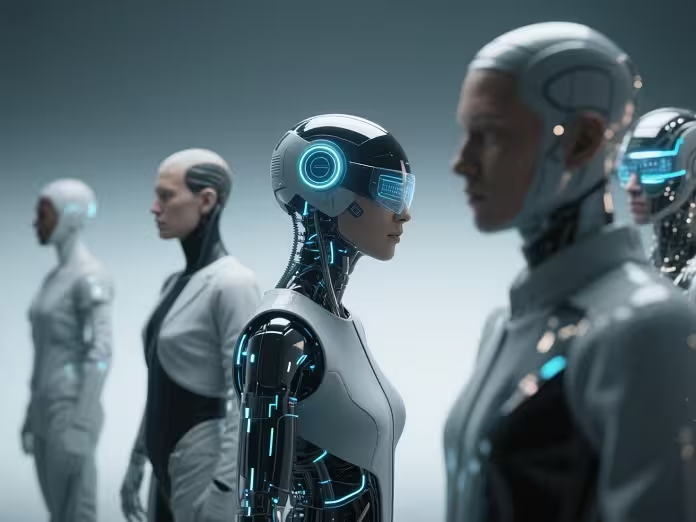
We stand at the precipice of humanity’s greatest transformation since the agricultural revolution. The convergence of biotechnology, artificial intelligence, and digital innovation is rapidly reshaping what it means to be human. This isn’t science fiction anymore—it’s the dawn of human digital evolution, where the boundaries between biology and technology blur into something extraordinary.
“Cyborg Reality: How Humans Are Evolving Digitally.”
The Digital Revolution Within Our Bodies
The concept of human digital evolution encompasses the integration of digital technologies directly into our biological systems. Unlike previous technological advances that remained external tools, today’s innovations are becoming part of us. Neural implants restore sight to the blind, robotic prosthetics respond to thought commands, and genetic editing tools rewrite the very code of life.
Elon Musk’s Neuralink represents just the beginning of this transformation. The brain-computer interface technology promises to treat neurological conditions while simultaneously enhancing human cognitive abilities. Early trials show paralyzed patients controlling computers with their thoughts, but the implications stretch far beyond medical applications.
Companies like Synchron and Paradromics are developing competing neural interfaces that could eventually allow direct brain-to-internet connections. Imagine accessing the world’s knowledge instantaneously, communicating telepathically, or uploading memories directly to digital storage. These aren’t distant fantasies—they’re technologies in active development.
Genetic Programming: Rewriting Human Code
CRISPR-Cas9 technology has democratized genetic editing, allowing scientists to modify DNA with unprecedented precision. This biological programming language enables us to eliminate hereditary diseases, enhance physical capabilities, and potentially extend human lifespan indefinitely.
Recent breakthroughs in base editing and prime editing have made genetic modifications even more accurate and safe. Clinical trials are underway for treating sickle cell disease, blindness, and various cancers through genetic modification. But the technology’s potential extends far beyond medical applications.
Enhanced intelligence, improved physical strength, resistance to aging, and immunity to diseases could become standard human upgrades. Some researchers predict that within decades, parents might routinely edit their children’s genes to provide competitive advantages in an increasingly enhanced world.
The Cyborg Reality: Merging Flesh and Silicon
Biohacking communities worldwide are already experimenting with human enhancement technologies. From magnetic implants that provide electromagnetic sensory input to RFID chips that replace keys and credit cards, early adopters are pioneering the cyborg lifestyle.
Advanced prosthetics have evolved from simple mechanical limbs to sophisticated devices that provide sensory feedback and neural control. Companies like Ossur and Ottobock are developing prosthetics so advanced that amputees report preferring them to biological limbs in certain situations.
Sensory augmentation represents another frontier in human digital evolution. Researchers have successfully implanted devices that allow people to “see” through their tongues, hear electromagnetic fields, and feel magnetic north. These technologies expand human sensory capabilities beyond our biological limitations.
Digital Consciousness and Virtual Existence
Virtual and augmented reality technologies are creating new dimensions of human experience. As these platforms become more sophisticated, the distinction between physical and digital reality continues to diminish. Meta’s metaverse vision, Apple’s spatial computing, and emerging haptic technologies suggest a future where digital existence becomes as meaningful as physical presence.
Brain uploading, while still theoretical, represents the ultimate expression of human digital evolution. Companies like Nectome are researching methods to preserve and potentially digitize human consciousness. If successful, this technology could enable true digital immortality, allowing human minds to exist independently of biological bodies.
The philosophical implications are staggering. What defines human identity when consciousness can be copied, modified, or enhanced? How do we maintain human values and ethics in a post-biological world?
Economic and Social Transformation
Human digital evolution will fundamentally reshape society and economics. Enhanced humans may outperform unenhanced individuals in virtually every domain, creating new forms of inequality based on technological access rather than natural ability.
The job market faces unprecedented disruption as enhanced humans and AI systems collaborate in ways previously impossible. Traditional education models become obsolete when knowledge can be directly downloaded to the brain. Economic systems must adapt to a world where human capital can be artificially augmented or even replicated.
Social structures will evolve to accommodate enhanced humans with extended lifespans, modified genetics, and digital consciousness. Legal frameworks must address questions of enhanced human rights, digital identity ownership, and the boundaries of human modification.
Ethical Considerations and Risks
The rapid pace of human digital evolution raises critical ethical questions. Who controls enhancement technologies? How do we prevent the creation of genetic castes? What happens to human agency when our thoughts can be monitored or influenced through neural interfaces?
Bioethicists warn of potential risks including loss of human autonomy, creation of enhanced elite classes, and unforeseen consequences of genetic modifications. The irreversible nature of many enhancement technologies demands careful consideration of long-term implications.
Religious and cultural perspectives add another layer of complexity. Many traditions view human enhancement as playing God or corrupting natural human essence. Balancing technological progress with respect for diverse beliefs presents ongoing challenges.
The Inevitable Future
Despite ethical concerns and technical challenges, human digital evolution appears inevitable. Military applications drive significant research funding, creating powerful incentives for continued advancement. International competition ensures that restrictions in one country will likely be circumvented elsewhere.
The question isn’t whether humans will evolve digitally, but how quickly and equitably this transformation will occur. Early adopters of enhancement technologies will gain tremendous advantages, potentially creating irreversible societal divisions.
Young generations, having grown up with smartphones and social media, show greater acceptance of human-technology integration. This cultural shift suggests broader adoption of enhancement technologies as they become available.
Preparing for Human 2.0
As we approach this unprecedented transformation, preparation becomes crucial. Educational systems must evolve to teach enhanced human-AI collaboration. Legal frameworks need updating to address enhanced human rights and responsibilities. Healthcare systems must integrate enhancement technologies with traditional medicine.
Individual preparation involves staying informed about emerging technologies, considering personal enhancement preferences, and developing adaptable skills that remain valuable in an enhanced world.
The rise of human digital evolution represents humanity’s next great adventure. Whether this transformation leads to utopia or dystopia depends on the choices we make today. The future of human consciousness, capability, and existence hangs in the balance as we step boldly into the age of Human 2.0.



































